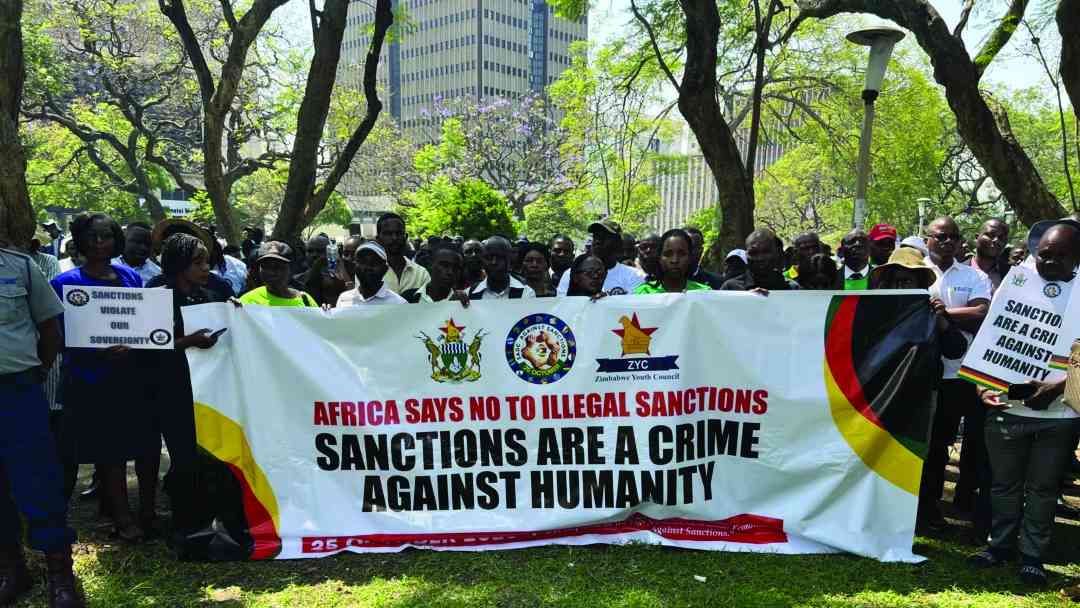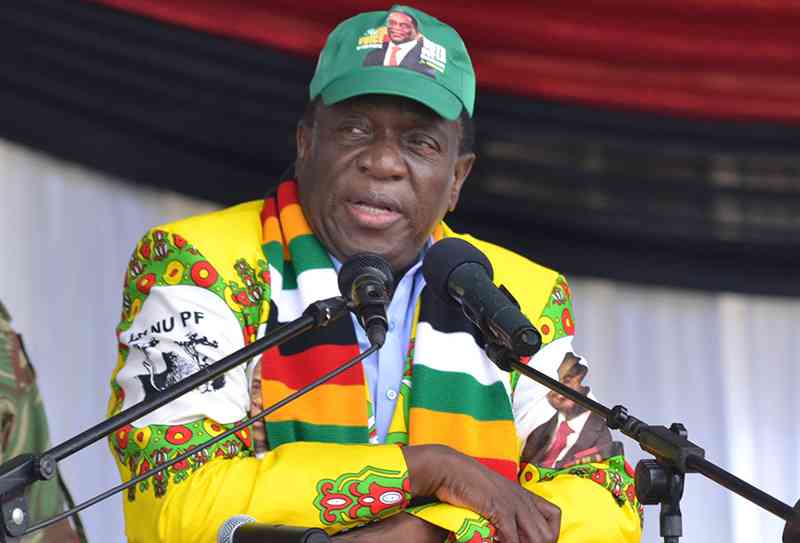
TARGETED sanctions are imposed by individual states, subregions, regional or supranational or intergovernmental organisations.
Six or seven types of sanctions exist under the United Nations regime. They include individual or entity sanctions. Entity sanctions are imposed on companies or political parties.
Zimbabwe currently has three members of the presidium, a prominent businessman, and a former minister of state security placed on targeted sanctions by the United States (US) government.
Other types of sanctions include diplomatic sanctions. They are meant to place restrictions on the diplomatic activities of a governing body or government in terms of limiting the accreditation of personnel, travel and so forth.
We also have other types such as arms embargoes. Commodity sanctions are imposed on natural resources, such as diamonds, timber, oil, and wildlife. For Zimbabwe, critical restrictions were imposed on diamonds from Marange.
Many people are aware of the world talk around the Kimberley Certification processes and debates around bloody diamonds, as well as, destruction of cultural rights of the locals where they were forced to leave their ancestral lands without compensation.
We also have transportation sanctions where prohibitions of international transit of sea or air carriers from or to the targeted state are common.
Economic sanctions also exist and include investments bans, limitations of banking services domestically or internationally, and limitations of sovereign wealth funds. For Zimbabwe, economic sanctions by the European Union (EU) and the US fall under what are generally known as sanctions by the ‘West.’
- Mavhunga puts DeMbare into Chibuku quarterfinals
- Bulls to charge into Zimbabwe gold stocks
- Ndiraya concerned as goals dry up
- Letters: How solar power is transforming African farms
Keep Reading
Beyond legality of sanctions
Sanctions are soft measures imposed on recipients either on a targeted or comprehensive basis. They are largely part of soft international law, which is by and large not binding. The legality of sanctions has never been properly canvassed in Zimbabwe’s history because the powers that be and the circle of their political and ideological friends will always use other factors like ‘Zimbabwe is a sovereign state’, ‘the West wants regime change,’ and so forth.
During the Unilateral Declaration of Independence (UDI), the expectation was that liberal Rhodesians would oppose Ian Smith. United Kingdom and then prime minister Harold Wilson overestimated how oil sanctions would paralyse industry and agriculture in Rhodesia. It would only take a cease-fire charter to bring warring parties to the negotiation table, 15 years later!
Three pillars of targeted sanctions
Under the UN sanctions regime, which is modified by regions, subregions, or states, embargoes have coercive, constraining and signalling effects. Coercion is the principal purpose of sanctions.
It is meant to change the behaviour of the target. This failed during the UDI and during Robert Mugabe’s regime in Zimbabwe. When the UK imposed sanctions on Mugabe, he became confrontational in his ‘Blair Keep your England and I keep my Zimbabwe’ speech.
Because of Mugabe’s political persuasion and ‘granddaddy’ of Africa politics, he outsmarted the west easily.
Domestically, he used the fast-track land reform to appease his backers and took away the land agenda from the opposition Movement for Democratic Change (MDC). Land redistribution became a resource used by Zanu PF and Mugabe to buy political time.
Jingles such as the ‘Blair that I know is a toilet’, became popular, emphasising that land would be forcibly taken with or without British support. The UK again gave Mugabe the power to act defiantly.
By parity of reasoning, the UK wanted sanctions to radicalise Mugabe. Here I read Claire Short’s letter in 1997 where the election of a government without links to former colonial interests meant Britain no longer had special responsibility to meet the cost of land purchases.
She also indicated her own origins were Irish and told the Zimbabwean government how it knew, as Irish people ‘we were colonised, not colonised!’
It seemed from her statement, Short, as the international development secretary, had given Mugabe and his government qualified support to embark on the land reform programme.
Under President Emmerson Mnangagwa, the EU, US and UK government maintained different regimes. The US renewed the Zimbabwe Democracy and Economic Recovery Act of 2001 (Zidera), emphasising democratic reform.
It took a whole presidential term and contested elections for the US to move from comprehensive to targeted sanctions. In a way, the US’s recent move has largely qualified the argument by Zimbabwean government and Africa that the comprehensive sanctions were illegal.
We may also argue that the targets have complied with the demands placed on them and should do so because they deem it more preferable than non-compliance. Here we can refer to the Zimbabwe Defence Industry, which has been removed.
There is no doubt that the Zimbabwe Defence Forces has progressively been showing marks of professionalisation. This is so when one considers the refusal by its leader to be an ex-officio member of Zanu PF. This move would have either forced General Valerio Sibanda to resign or be conflicted.
We have also seen how senior members of the Defence Forces have been retired by the President without event, and the promotion of academic freedom by the National Defence University.
The constraint arm is meant to reduce the capacity of targets to achieve their objectives through restricting their access to essential resources. On the surface, one might say businessman Kuda Tagwirei, and his companies may not be able to procure internationally.
In fact, constraining sanctions do not require a target to do something, but rather are intended to impede its objective.
It is like when we were in secondary education, one teacher caught me hugging a girl. We did not notice his presence. Akangondibhabhadzira pabendekete, vernacular for a friendly pat on the shoulders. He then said, ‘Sharon!’ Immediately ndakavhazuka, vernacular Shona for an electric shock. So, every time I was wayward, he would simply shout on the top of his voice, ‘Sharon!’ I would always remember the incident with the girl and would immediately behave to avoid being written in the school’s black book.
So, when I watched President Mnangagwa saying, “the US expected me to thank them, I don’t do that because it’s illegal”, it got me thinking. The US is not coercing the President that a specific course of action is in his best interest. It is rather, to remind the President, constraining him because they know he does not have the persuasive element to comply.
Constraining Mnangagwa seeks to limit options available to him. This could mean members of the presidium and close allies might not support the President’s calls for a third term.
Alternatively, Tagwirei, who has been facing allegations of state capture, would not procure internationally.
This takes us to the third arm of signalling something. Sanctions signal or communicate something. Sanctions send signals to targets with no direct material costs or benefits. This is done either through proscriptions or prescriptions.
Under proscriptions, the UN uses sanctions against nuclear proliferation, terrorism, engaging in war or armed conflict and so forth. The African Union (AU) uses proscriptions against non-constitutional changes of government and human rights violations.
Prescriptions include using sanctions for the protection of civilians (R2P), authorisations of the UN Security Council, authorisation of regional arrangements in the Southern African Development Community (Sadc), Economic Community of West African States (Ecowas), Association of Southeast Asian Nations (ASEAN), EU, and so forth.
Signals are made to the domestic population as was done by the US recently on Zimbabwe by telling citizens that only 14 members are targeted. What that means is that three members in the Presidium, representing the executive or one arm of the State are targeted.
Communication is also made to the institutions that benefit from USAid, the US President’s Emergency Plan for Aids Relief (PEPFAR) and others like scholarships. The US again has Zanu PF to thank, and the ruling party has the US to thank for making Zimbabwe governable, through those various institutional supports.
Internationally, the US seems to be communicating to Sadc to resolve the Zimbabwe elections question procedurally. Sadc had two impending decisions on Zimbabwe’s 2023 election impasse and the possible assumption of Sadc chairmanship by Zimbabwe. So, will Sadc be sanctioned as well?
- Hofisi is a lawyer, conversationalist and transdisciplinary researcher. He has interests in governance and international law. — sharonhofii@gmail.com.






